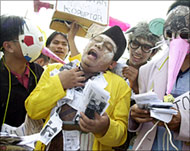Indonesian parties prepare for poll
Indonesia starts campaigning on Thursday for parliamentary elections expected to benefit the party of ex-dictator Suharto amid disappointment at the slow pace of democratic reforms since his ousting in 1998.

Twenty-four parties will contest the ballot on 5 April, only the second since the downfall of Suharto after his 32 years in power.
They will be followed by the country’s first direct presidential election in July.
On Thursday, political parties were expected to parade through the streets of the capital, Jakarta, in the first of what will likely be numerous colourful displays of support across the country.
Leaders of the main parties signed a pledge on Wednesday to avoid inciting their supporters to violence in the run-up to polling day.
“We agree on a spirit of peace, as no party wants bloodshed during the campaign,” said Sucipto, the secretary-general of President Megawati Sukarnoputri’s ruling Indonesian Democratic Party of Struggle. Sucipto, like many Indonesians, goes by a single name.
The national electoral commission says more than 147 million people are eligible to cast ballots.
Polls
Opinion polls have indicated the Golkar party, Suharto’s old political group, may emerge as the largest party in the country’s 550-seat parliament after the polls.
 |
|
Students depict corruption |
According to a recent survey commissioned by the Washington-based International Republican Institute (IRI), Golkar could win at least 24% of the votes.
Despite being discredited by its association with the former strongman and the rights abuses under his reign, many voters now apparently yearn for the stability of the Golkar years, when the economy grew at rates of seven to eight per cent annually.
Megawati’s party won 34% of the vote in the first post-Suharto elections in 1999. This time it is expected to garner about a fifth of the vote.
Regional councils
|
“We agree on a spirit of peace, as no party wants bloodshed during the campaign” Sucipto, |
Voters will choose all 550 legislators for the next national parliament for a five-year term, plus members of a new Regional Representatives Council and members of provincial and district legislatures.
For the first time, the next national parliament will be fully elected after the police and military gave up their 38 reserved seats.
The national parliament will be chosen through an open list proportional to the representation system. Voters must select one party and will be able for the first time to vote for a specific candidate if they wish.
Official “paper” results are to be announced by 28 April, but a computerised count is expected to give an unofficial result within two days of voting.